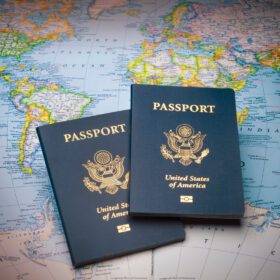The Ultimate Guide to the Best Countries for Remote Workers in 2025
Recent Blog
Ready to explore the world?
Post Tags
The Ultimate Guide to the Best Countries for Remote Workers in 2025
- Joseph Chanlatte
- Travel Blogs
Picture this: You’re sipping artisanal coffee in a Lisbon café, laptop open, crushing that morning presentation while the Atlantic breeze whispers through centuries old cobblestone streets. Or maybe you’re more of a Bangkok after-dark type, coding until 2 AM in a sleek coworking space where the rent costs less than your hometown’s monthly parking fee.
Welcome to the golden age of remote work destinations, where your office can be anywhere with decent Wi-Fi and a dream. Gone are the days when “working from home” meant your kitchen table. Today’s best countries for remote workers are rolling out red carpets, crafting special visas, and basically begging talented professionals to bring their laptops and stay awhile.
But here’s the thing, choosing where to plant your remote work flag isn’t just about Instagram-worthy backdrops. It’s about finding that sweet spot where your dollar stretches further, your internet doesn’t buffer during crucial Zoom calls, and you won’t need a law degree to understand the tax implications.
Let me walk you through the countries for digital nomads that are absolutely crushing it in 2025, plus everything you need to know to make your remote work dreams a reality.
Table of Contents
ToggleTable of Contents
What Makes a Country Perfect for Remote Workers?
Before we dive into the good stuff, let’s talk about what separates the wheat from the chaff in international remote work destinations. I’ve learned this the hard way, through trial, error, and one particularly disastrous month in a “digital nomad paradise” where the internet went down every time it rained (which was daily).
Internet Infrastructure That Actually Works Your Wi-Fi speed isn’t just a nice to have; it’s your lifeline. The best countries for remote workers understand this and have invested heavily in digital infrastructure. We’re talking fiber optic networks that make your hometown internet look like dial-up.
Cost of Living Sweet Spots Here’s where math becomes your best friend. The cost of living for remote workers varies dramatically, and smart nomads know how to leverage geographic arbitrage. Earning Silicon Valley salaries while paying Southeast Asian rent? That’s not just possible it’s the new normal.
Legal Framework That Makes Sense Nothing kills the remote work vibe quite like tax complications or visa nightmares. The smartest remote work friendly countries have created clear, straightforward paths for digital professionals.
The Digital Nomad Visa Revolution
Let’s talk about the game changer that’s transformed remote job opportunities worldwide: digital nomad visas. These aren’t your grandfather’s work permits, they’re sleek, modern solutions designed for today’s location-independent professionals.
Portugal’s D7 Visa: The European Dream. Portugal didn’t just join the remote work party, they threw it. Their D7 visa is practically a love letter to digital nomads, offering a pathway to European residency that’s both achievable and attractive. Remote work in Portugal has exploded, and for good reason.
The requirements? Prove you earn at least €640 monthly (which, let’s be honest, is probably less than your coffee budget), show accommodation arrangements, and demonstrate health insurance. In return, you get access to one of Europe’s most stunning countries, world-class healthcare, and a cost of living that won’t bankrupt you.
Estonia’s Digital Nomad Visa: Tech Meets Tradition Estonia, the country that gave us Skype, has created a digital nomad visa that’s as efficient as their e-governance system. For €80 and some paperwork, you can work remotely from this Baltic gem for up to a year.
What makes Estonia special? It’s not just the medieval charm of Tallinn or the fact that you can handle most bureaucracy online. It’s the robust digital infrastructure and a government that actually understands remote work.
Top Tier Destinations: Where the Magic Happens
Portugal: The Iberian Paradise
Remote work in Portugal isn’t just trendy, it’s transformative. Lisbon and Porto have become magnets for expat destinations for remote work, and I totally get why.
The numbers speak for themselves: internet speeds averaging 100+ Mbps, cost of living roughly 30% lower than Western European capitals, and enough pastéis de nata to fuel your productivity indefinitely. Plus, the work-life balance abroad here hits different when your lunch break involves actual sunshine and Atlantic views.
Best cities for digital nomads in Europe don’t get much better than Lisbon’s trendy neighborhoods or Porto’s riverside charm. The coworking spaces abroad scene is thriving, with spots like Second Home Lisbon offering everything from meditation rooms to rooftop terraces.
Thailand: The Southeast Asian Powerhouse
Bangkok and Chiang Mai have been digital nomad staples for years, but Thailand keeps evolving. The cost of living for remote workers remains incredibly attractive, think $500 to $800 monthly budgets that include accommodation, food, and transportation.
The internet infrastructure has dramatically improved, with most coworking spaces offering dedicated fiber connections. Plus, the expat communities for remote workers are well established, making networking and socializing effortless.
Estonia: The Digital Pioneer
Don’t let its small size fool you, Estonia is a remote work giant. Tallinn offers best cities for digital nomads vibes with medieval architecture, modern amenities, and some of Europe’s fastest internet.
The digital nomad visa requirements are refreshingly straightforward, and the English proficiency levels mean you won’t struggle with daily communications. It’s perfect for those seeking remote work-friendly countries with English speakers.
Mexico: The Americas’ Hidden Gem
Mexico City, Playa del Carmen, and Tulum have become remote work destinations that combine affordability with culture. The cost of living advantage is substantial, earning in dollars while spending in pesos creates incredible lifestyle opportunities.
The coworking communities and expat networks are thriving, especially in Mexico City’s Roma Norte or Tulum’s beach, adjacent spaces.
The Financial Reality Check
Let’s talk money, because even paradise has a price tag. Understanding the cost of living for remote workers across different destinations is crucial for making smart decisions.
| Country | Monthly Budget (USD) | Internet Speed | Visa Cost | Healthcare Quality |
|---|---|---|---|---|
| Portugal | $1,200-2,000 | 100+ Mbps | €80-320 | Excellent |
| Thailand | $800-1,500 | 50+ Mbps | $60-180 | Good |
| Estonia | $1,500-2,500 | 150+ Mbps | €80 | Excellent |
| Mexico | $900-1,600 | 25+ Mbps | Free-$200 | Variable |
| Malaysia | $700-1,200 | 100+ Mbps | $200-300 | Good |
These numbers aren’t just statistics, they’re your roadmap to financial freedom through geographic arbitrage.
Internet Infrastructure: Your Digital Lifeline
Nothing ruins a remote work day quite like buffering during your biggest presentation. The internet speed by country for remote work varies dramatically, and smart nomads do their homework.
Portugal and Estonia lead the pack with fiber networks that’ll make you forget about connection issues. Thailand’s major cities offer excellent speeds, though rural areas can be hit or miss. Mexico’s infrastructure is rapidly improving, especially in nomad heavy areas.
Pro tip: Always have backup plans. Mobile hotspots, coworking spaces with guaranteed speeds, and even café hunting can save your productivity when home internet fails.
Legal and Tax Considerations
Here’s where things get serious. Tax implications for remote workers can make or break your nomad dreams, and ignorance isn’t bliss, it’s expensive.
Portugal offers tax benefits for new residents, while Estonia’s tax system is surprisingly straightforward for short-term stays. Thailand requires careful navigation of visa runs and tax residency rules.
The golden rule? Consult with international tax professionals before making moves. Companies like Remote.com and Deel specialize in helping remote workers navigate these complexities legally and efficiently.
Healthcare: Staying Healthy While Working Abroad
Healthcare for remote workers abroad varies wildly, but the smart money is on countries with robust public systems plus private insurance backup.
Portugal’s SNS (national health service) is world-class and accessible to residents. Estonia offers excellent care with English-speaking providers. Thailand’s private healthcare is affordable and high quality, though public options vary.
For nomads, SafetyWing and Cigna Global Health offer flexible coverage that travels with you, providing peace of mind regardless of your location.
Building Community: The Social Side of Remote Work
Working remotely doesn’t mean working alone. The best countries for remote workers have thriving expat communities and professional networks.
Lisbon’s nomad scene is legendary, with regular meetups, networking events, and collaborative spaces. Bangkok offers everything from professional associations to social clubs. Tallinn’s compact size means tight knit communities where everyone knows everyone.
Platforms like InterNations and Nomad List help connect you with like-minded professionals before you even arrive. Coworker.com isn’t just about finding workspace, it’s about finding your tribe.
Work-Life Balance: The Ultimate Goal
The best work-life balance abroad comes from choosing destinations that align with your lifestyle goals. Portugal offers weekend escapes to beaches, mountains, or historic cities. Thailand provides tropical relaxation and cultural immersion. Estonia delivers European sophistication with Nordic wellness culture.
Remember, work-life balance isn’t just about shorter commutes (though eliminating them entirely helps). It’s about creating environments where you can thrive professionally while living fully.
Essential Tools for Remote Work Success
The right tools can make or break your remote work experience. Here’s what the pros swear by:
Financial Management
- Wise for multicurrency accounts and low fee transfers
- Revolut for international banking and budgeting
- XE Currency for real time conversion rates
Productivity and Collaboration
- Notion for organization across time zones
- Slack for seamless team communication
- NordVPN for secure, unrestricted internet access
Accommodation and Networking
- Airbnb for monthly stays and nomad friendly options
- InterNations for expat networking
- Nomad List for comparing destinations and connecting with communities
Health and Insurance
- SafetyWing for nomad specific coverage
- Cigna Global Health for comprehensive international plans
Making the Leap: Your Action Plan
Ready to join the remote work revolution? Here’s your step by step guide:
Research Phase (1 to 2 months) Use Nomad List to compare destinations based on your priorities; cost, climate, connectivity, and community. Join Facebook groups and Discord servers for your target locations.
Legal Preparation (1 to 3 months) Research digital nomad visa requirements for your chosen destinations. Consult with international tax advisors about your specific situation. Ensure your health insurance provides international coverage.
Financial Setup (2 to 4 weeks) Open international banking accounts through Wise or Revolut. Set up automatic savings for visa fees, flights, and initial living expenses. Calculate your target monthly budget including emergency funds.
Trial Run (1 to 3 months) Consider starting with a shorter stay to test the waters. Book accommodation through Airbnb or Booking.com for flexibility. Join local coworking spaces to build immediate community.
Frequently Asked Questions
Which countries offer special digital nomad or remote work visas? Portugal, Estonia, Barbados, Dubai, and dozens of others now offer digital nomad visas. Requirements typically include proof of income, health insurance, and clean criminal records.
What are the main benefits of working remotely from abroad? Geographic arbitrage, cultural immersion, improved work-life balance, tax advantages, and expanded professional networks top the list.
Which countries have the lowest cost of living for remote workers? Thailand, Malaysia, Mexico, and Eastern European countries like Estonia offer excellent value. Your dollar stretches furthest in Southeast Asia and Latin America.
Where can I find strong internet connectivity and digital infrastructure globally? Portugal, Estonia, South Korea, and Singapore lead in connectivity. Most major cities in Thailand, Mexico, and Malaysia offer reliable high-speed internet.
Can I work for a foreign company while living in another country as a remote worker? Generally yes, but tax implications vary by country. Companies like Deel and Remote.com specialize in navigating these complexities legally.
The Bottom Line
The best countries for remote workers in 2025 aren’t just about cheap living or fast internet, they’re about creating environments where digital professionals can thrive personally and professionally.
Whether you’re drawn to Portugal’s coastal charm, Thailand’s tropical affordability, or Estonia’s digital sophistication, the key is matching destinations to your specific needs and goals.
Remote work isn’t just a job perk anymore it’s a lifestyle choice that opens doors to experiences our parents never imagined possible. The world has become your office, and these countries are rolling out the welcome mat.
Ready to trade your commute for adventure? Start researching, start planning, and start living the remote work dream. Your future self will thank you for taking the leap.

The remote work revolution is here, and the best time to join was yesterday. The second best time? Right now. Your perfect remote work destination is waiting you just need to be brave enough to find it.
Thinking about taking your remote job overseas?
Working abroad is just one part of the expat journey. For a deeper look at what it takes to build a life in another country beyond Wi-Fi and coworking spaces read Living Abroad as an Expat: Your Complete Guide to International Life. It covers everything from settling in to thriving long-term, no matter where you land.
Affiliate Disclaimer: This article contains affiliate links, meaning I may earn a commission if you click through and make a purchase, at no extra cost to you.
Travel is one of the best gifts I’ve ever given myself, and I want others to experience that same magic. If you’re a travel enthusiast, the faveplus travel site is an all-in-one guide packed with real, actionable steps to help you get out there and explore the world.










